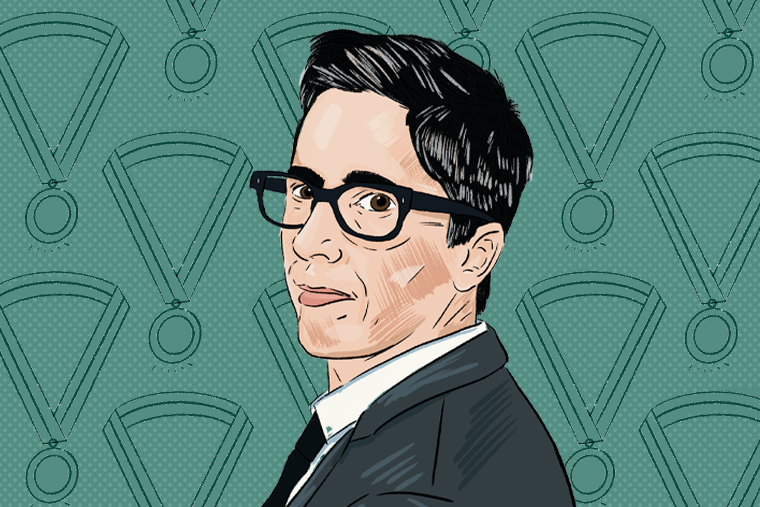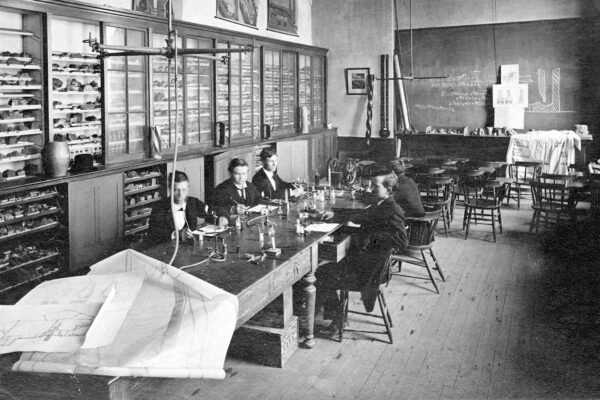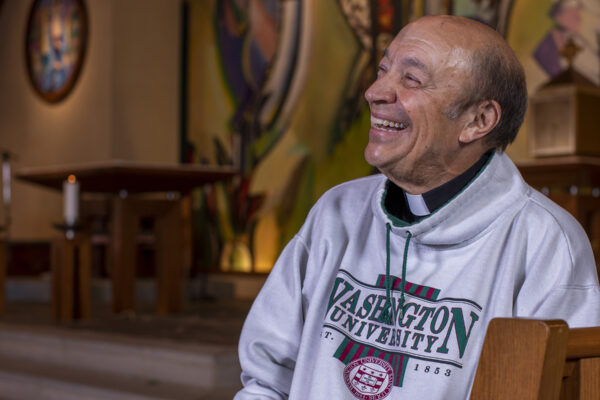It’s a warm fall afternoon and Clark-Fox Forum is buzzing with anticipation.
A capacity crowd has gathered to see cartoonist Alison Bechdel, known for her richly layered depictions of queer life and family relationships, receive the 2022 International Humanities Prize from Washington University. Hundreds more tune in to the livestream at home and from an overflow watch party in Givens Hall.
“Today we are celebrating Alison Bechdel,” begins Rebecca Wanzo, author of The Content of Our Caricature: African American Comic Art and Political Belonging (2020) and professor and chair of women, gender, and sexuality studies in Arts & Sciences. “We are celebrating her ambassadorship of comics and cartooning, her decades-long celebration of lesbian communities and chosen families, and above all, her beautiful and heart-transformative work.”
That work includes Dykes to Watch Out For, the much-loved comic strip Bechdel syndicated from 1983 to 2008, and her celebrated memoir Fun Home: A Family Tragicomedy (2006), which chronicles Bechdel’s relationship with her closeted father. Adapted into a Tony Award–winning musical, Fun Home was followed by two additional memoirs: Are You My Mother? (2012) and The Secret to Superhuman Strength (2021).
“Every author has one subject that they write about again and again,” Bechdel quips in her acceptance speech. “My subject is myself.”
“Every author has one subject that they write about again and again. My subject is myself.”
Alison Bechdel
But no artist is an island, and Bechdel’s true theme for the evening is the often-circuitous nature of artistic influence. For Bechdel, this is exemplified by poets Anne Bradstreet (1612–72) and, especially, Adrienne Rich (1929–2012), whose writing displayed an uncanny knack for finding the cartoonist at key moments in her own personal and professional development.
Days later, Stephanie Kirk, director of the Center for the Humanities in Arts & Sciences — which organizes the prize — is still thinking about Bechdel’s talk. “The humanities, by their nature, are deeply interdisciplinary,” Kirk muses. “Few scholars are able to work on, say, a body of literature without considering the context in which it was formed or other intersecting discourses.”
That sense of bridging communities, Kirk adds, has become a defining feature of the WashU humanities prize. Bechdel’s work, for example, can be situated within literary and visual arts traditions, but it also speaks to the concerns of gender studies, psychology, performing arts and social justice activism.
“This is work that engages multiple publics,” Kirk says.
Cathedral of ideas
As a student at University City High School, Phyllis Wilson Grossman, AB ’66, would sometimes cut class to attend the WashU Assembly Series.
“It was a cathedral of ideas,” Grossman remembers of the lecture series. “I could learn about things that weren’t part of my everyday life. That was so exciting.”
In many ways, the biennial International Humanities Prize follows the Assembly Series model. Conceptualized by Grossman and her husband, David M. Grossman, PhD ’73 — through conversations with Gerald Early, the Merle Kling Professor of Modern Letters and founding director of the Center for the Humanities — it spans a variety of disciplines to honor sustained and significant contributions to the world of arts and letters. The Grossmans also created a permanent endowment to fund a cash prize, currently $25,000, that accompanies the award.
The inaugural recipient, Turkish novelist Orhan Pamuk, was awarded the prize in 2006 — weeks before accepting the Nobel Prize in literature. Subsequent recipients have included journalist Michael Pollan (2008), novelist Francine Prose (2010), filmmaker (and future WashU Commencement speaker) Ken Burns (2012), influential poetry scholar Marjorie Perloff (2014), and dancer and choreographer Bill T. Jones (2016).
Architect Sir David Adjaye, perhaps best known for designing the Smithsonian National Museum of African American History & Culture — and whose earthwork “Asaase III” is to be installed at The Griot Museum of Black History in St. Louis — received the prize in 2018.
Grossman notes that recipients are nominated entirely by WashU faculty, who present plans to include the recipient’s work in WashU classrooms. For example, last fall, Bechdel’s Fun Home was taught by Wanzo as well as Paige McGinley, associate professor of performing arts, and Chris A. Eng, assistant professor of English, all in Arts & Sciences.
While on campus, Bechdel met with students from all three classes and conducted studio critiques with MFA students studying illustration and visual culture in the Sam Fox School of Design & Visual Arts. She also attended a reception in WashU’s Mildred Lane Kemper Art Museum, which included a pop-up exhibit showcasing St. Louis–based comics artists.
Grossman, observing the critiques, was struck by Bechdel’s thoughtful engagement. “The care with which she went over each work was amazing,” Grossman concludes. “It was a marvelous day.”



